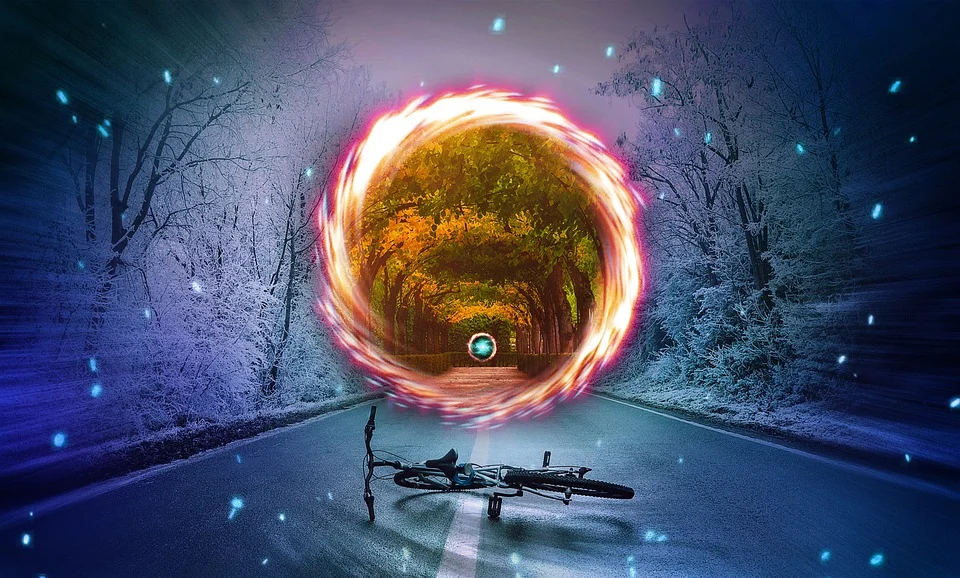info
 Portal is a series of first-person puzzle-platform video games developed by Valve. Set in the Half-Life universe, the two main games in the series, Portal (2007) and Portal 2 (2011), center on a woman, Chell, forced to undergo a series of tests within the Aperture Science Enrichment Center by a malicious artificial intelligence, GLaDOS, that controls the facility. Most of the tests involve using the “Aperture Science Handheld Portal Device” – the “portal gun” – that creates a human-sized wormhole-like connection between two flat surfaces. The player-character or objects in the game world may move through portals while conserving their momentum. This allows complex “flinging” maneuvers to be used to cross wide gaps or perform other feats to reach the exit for each test chamber. A number of other mechanics, such as lasers, light bridges, tractor funnels and turrets, exist to aid or hinder the player’s goal to reach the exit.
Portal is a series of first-person puzzle-platform video games developed by Valve. Set in the Half-Life universe, the two main games in the series, Portal (2007) and Portal 2 (2011), center on a woman, Chell, forced to undergo a series of tests within the Aperture Science Enrichment Center by a malicious artificial intelligence, GLaDOS, that controls the facility. Most of the tests involve using the “Aperture Science Handheld Portal Device” – the “portal gun” – that creates a human-sized wormhole-like connection between two flat surfaces. The player-character or objects in the game world may move through portals while conserving their momentum. This allows complex “flinging” maneuvers to be used to cross wide gaps or perform other feats to reach the exit for each test chamber. A number of other mechanics, such as lasers, light bridges, tractor funnels and turrets, exist to aid or hinder the player’s goal to reach the exit.
The Portal games are noted for bringing students and their projects from the DigiPen Institute of Technology into Valve and extending their ideas into the full games. The portal concept was introduced by the game Narbacular Drop and led to the basis for the first game. Another game, Tag: The Power of Paint, formed the basis of surface-altering “gels” introduced in Portal 2.
Both games have received near-universal praise, and have sold millions of copies. The first game was released as part of a five-game compilation, The Orange Box, and though intended as a short bonus feature of the compilation, was instead considered the highlight of the five. Its success led to the creation of the much longer Portal 2, which included both single player and cooperative player modes; it too received near-universal critical acclaim. In addition to the challenging puzzle elements, both games are praised for their dark humor, written by Erik Wolpaw, Chet Faliszek, and Jay Pinkerton, voice work by actors Ellen McLain, Stephen Merchant, and J.K. Simmons, and songs by Jonathan Coulton. A number of spin-off media have been developed alongside the games, and several of the game elements have become parts of Internet
History
 File:The Story of Portal- How Gabe Newell Fell In Love With Kim Swift’s Student Game. An animated history of how the Portal project came to Valve The concept of Portal was born out of a student project from the DigiPen Institute of Technology, entitled Narbacular Drop. The game included the aspects of placing portals on any flat surfaces and using them to maneuver around levels. Valve’s employees, attending a DigiPen career fair, saw their game and shortly later offered the entire team jobs at Valve to help expand on their idea.
File:The Story of Portal- How Gabe Newell Fell In Love With Kim Swift’s Student Game. An animated history of how the Portal project came to Valve The concept of Portal was born out of a student project from the DigiPen Institute of Technology, entitled Narbacular Drop. The game included the aspects of placing portals on any flat surfaces and using them to maneuver around levels. Valve’s employees, attending a DigiPen career fair, saw their game and shortly later offered the entire team jobs at Valve to help expand on their idea.
Valve originally saw Portal as an experimental game to be included with its upcoming compilation, The Orange Box, alongside its release of Half-Life 2: Episode Two and Team Fortress 2. To give the game character, a minimal story, tied loosely with the Half-Life world, was written by Valve’s Erik Wolpaw and Marc Laidlaw. They needed a character to guide the player through the game, coming onto a polite but humorous artificial intelligence, which would ultimately become the character of GLaDOS.
Counter-Strike: Global Offensive is a multiplayer shooter computer game developed by Valve and Hidden Path Entertainment. Counter-Strike: Global Offensive (CS: GO) is a sequel to the popular game Half-Life: Counter-Strike, which was released in 1999. Counter-Strike: Global Offensive was released on August 21, 2012.
The popularity and audience of CS: GO is constantly growing.
It is not the first year that a large number of sports tournaments, from amateur to professional, are held in the discipline The prize fund of the tournaments in CS: GO is constantly growing and amounts to $1,000,000 in some competitions. The game has a large number of weapon skins, they do not provide any additional advantage in the game, the price of which reaches several thousand dollars, and anyone can get them by playing the game or opening skins that also fall into the game. The finals of the major tournaments are broadcast on television, and bets on the outcome of the game are made by bookmakers, who talk about the further development and popularization of CS: GO.




